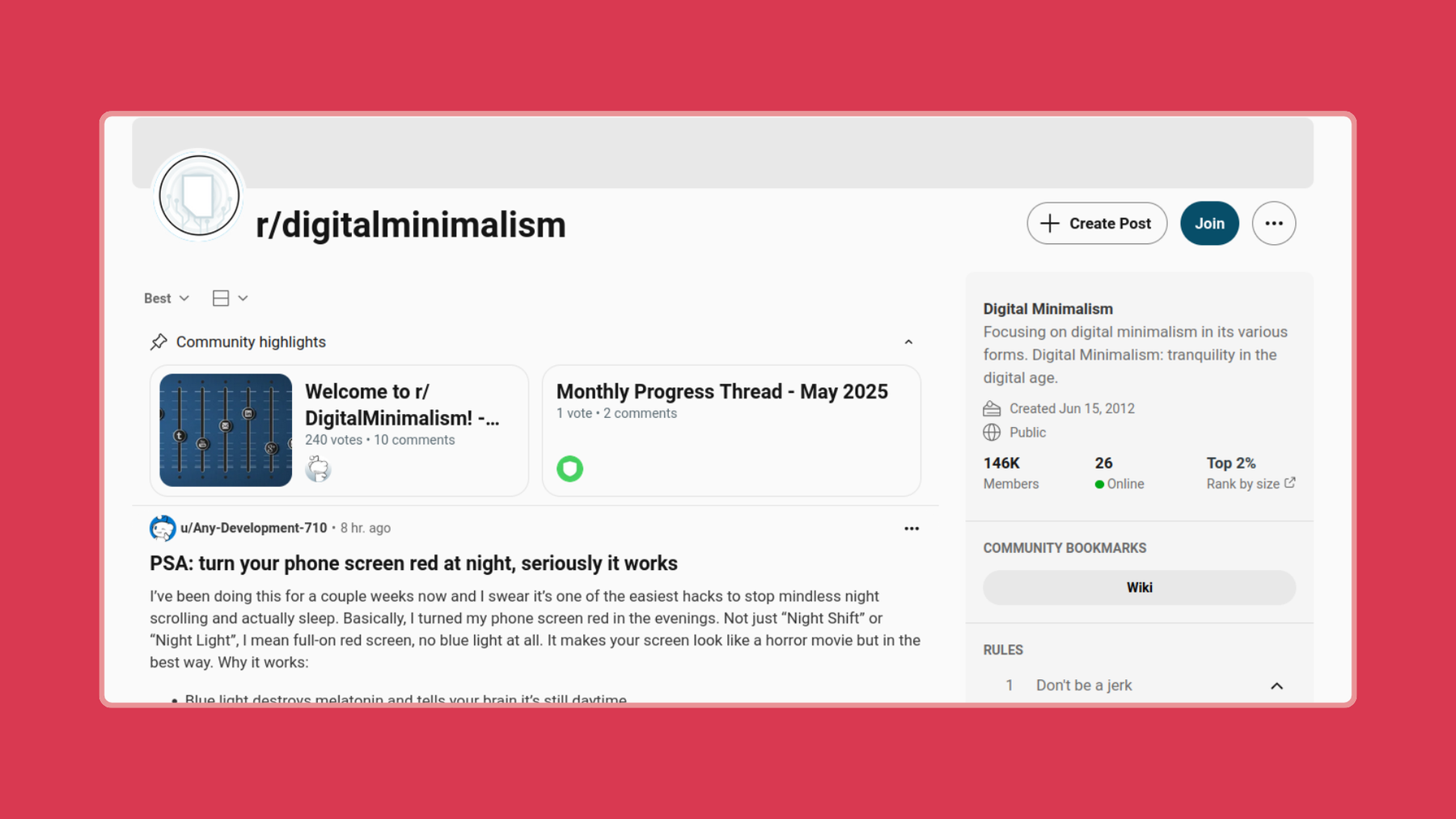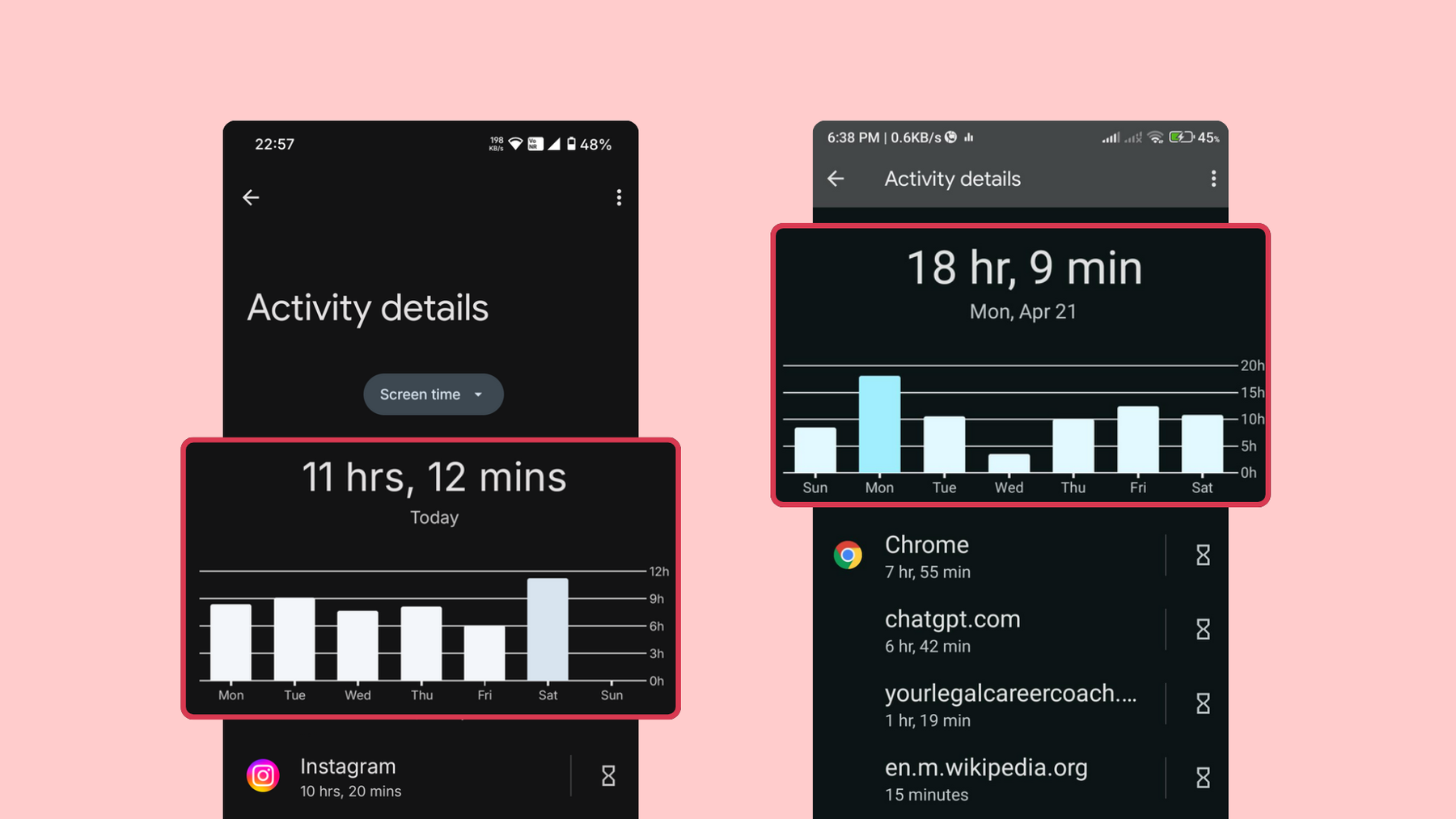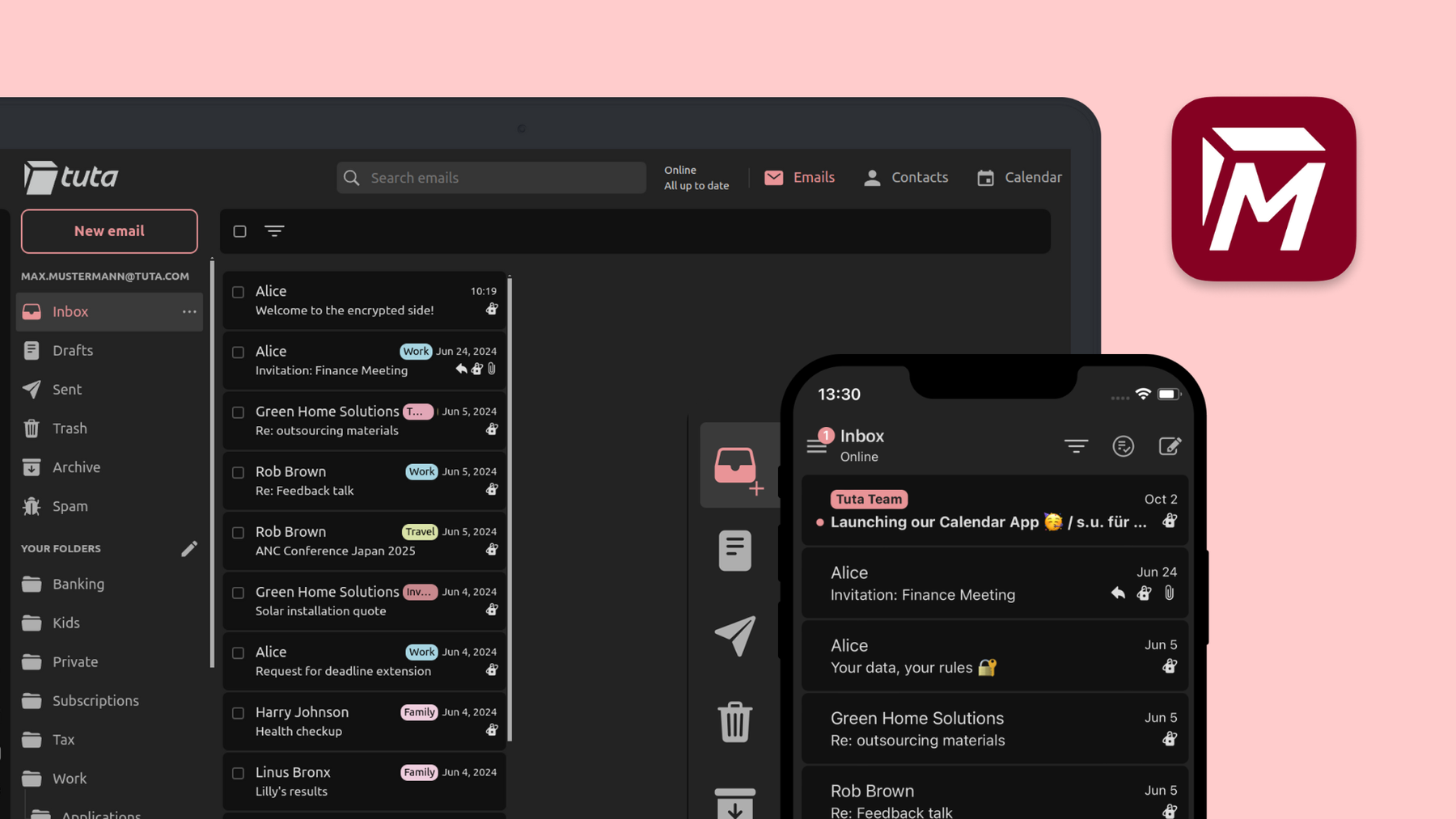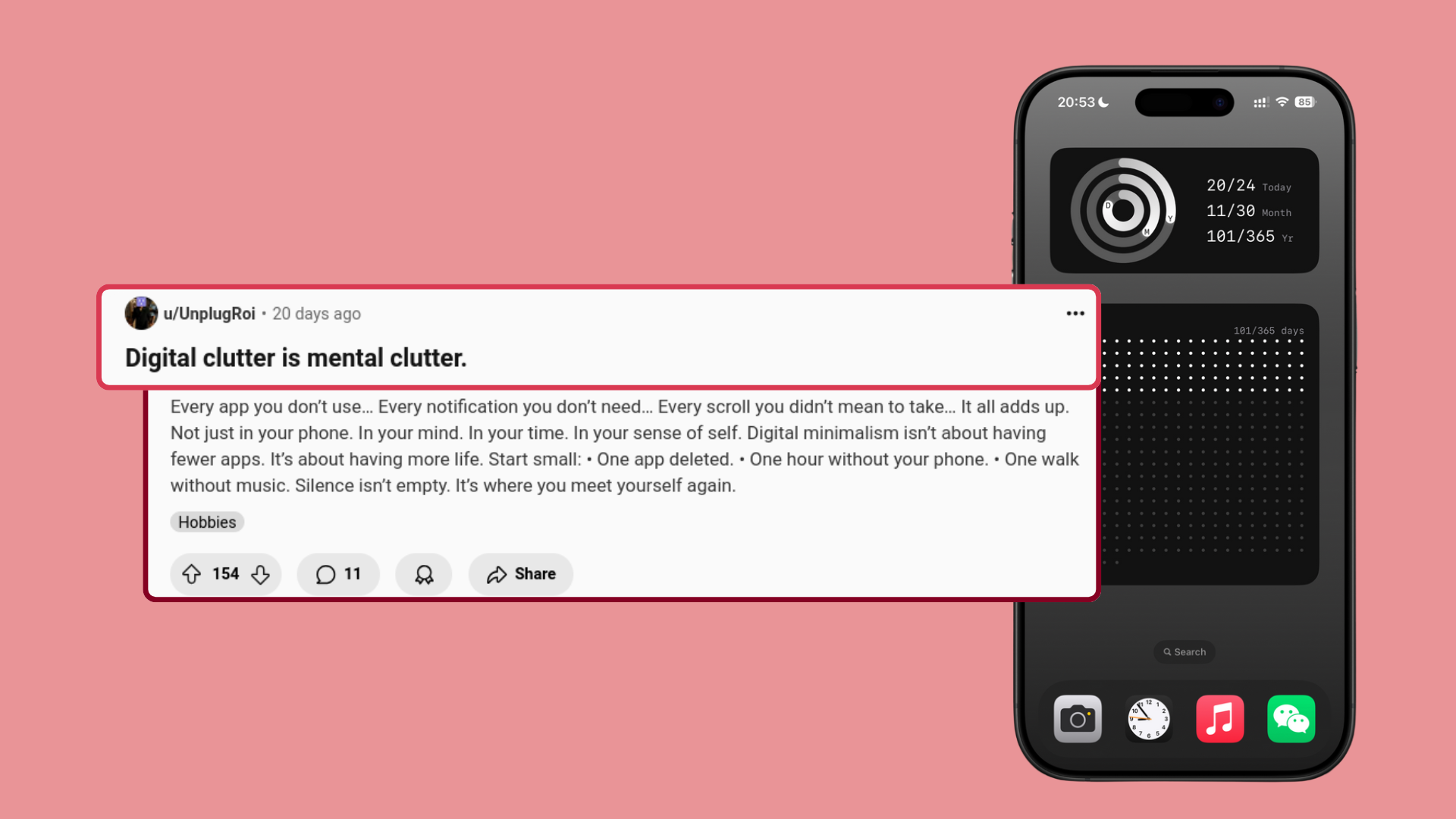什么是数字极简主义?(如何清除数字生活中的杂物)
如果你不想再花几个小时在 TikTok 上滚来滚去,或者厌倦了在 Facebook 上阅读负面新闻,那么实践数字极简主义就是你所需要的,你来对地方了。今天,我们来看看数字极简主义和整理数字生活的简单方法。
随着应用程序、服务和社交媒体的日益增多,我们现在上网和滚动浏览信息的时间比以往任何时候都要多—为了让你了解我们对智能手机的沉迷程度,平均每个人每天花在手机上的时间是 4 小时 37 分钟。 当我们沉迷于社交媒体和上网时,这就像我们在生活中过度做任何事情一样,会产生负面影响。因此,许多人不禁感到不知所措,甚至沉迷于手机。
由于过度消费和在屏幕前花费过多时间,人们开始选择减少数字消费,并在如何互动和使用数字平台方面做出更明智的选择。
什么是数字极简主义
什么是数字极简主义?让我们来看看卡尔-纽波特是如何描述它的:
“数字极简主义 是一种哲学,它能帮助你质疑哪些数字通信工具(以及围绕这些工具的行为)能为你的生活带来最大价值。它坚信,有意识地、积极地清除低价值的数字噪音,优化使用真正重要的工具,可以显著改善你的生活。- 卡尔-纽波特
所谓数字极简主义,是指不仅意识到通信和数字技术对生活的积极影响,更重要的是意识到其负面影响,并积极做出改变以减少这种影响。别担心—数字极简主义并不是要删除所有的应用程序 和停止所有的在线活动,而是要在使用社交媒体等数字服务时更加注意,并努力找到平衡点。
实践数字极简主义的一个例子就是删除 TikTok 和 Instagram 这两个极易上瘾的社交平台。或者,如果你不想彻底告别社交软件,你可以设定每天滚动社交软件的时间。


数字极简主义子论坛是一个非常值得加入的社区。在这个群组中,人们分享想法、技巧和有用的建议。
整理数字生活的技巧
如果你想有更多时间做真正重要的事,或者只是想更多地存在,那么实践数字极简主义可能正是你所需要的。正如前面提到的,做法没有对错之分,我们建议你看看这些整理数字生活的小贴士,并根据需要做出调整:)就像去 Google 化和改用注重隐私的替代品一样,这是一段旅程,而不是短跑。
社交媒体
最好的选择是删除你使用的社交媒体平台,尤其是那些你过度使用的平台。如果你还没有准备好迈出这么大的一步,我们建议你做一些小的改变,这些改变还是会有帮助的:
- 删除手机应用,尽量只通过笔记本电脑或平板电脑访问
- 取消关注品牌、网页和名人
- 取消关注或删除你不再联系或不想在推送中看到的朋友
- 离开任何你不再需要的群组
- 删除个人主页上的任何旧帖子、照片或分享
- 为你的社交媒体平台设置屏幕时间限制
Facebook 收集了您大量的数据,如果您还想使用 Meta 平台,我们建议您改进Facebook 的隐私设置。
电子邮件
- 如果您使用的是Gmail、Outlook 或Yahoo,请删除它们,换一个不会向您发送烦人广告的电子邮件提供商。
- 选择像Tuta Mail这样安全、私密、无广告或跟踪的邮箱。
- 退订新闻简报、广告和促销信息
- 删除不再需要的邮件,清理邮箱
- 将重要邮件移至指定文件夹
- 定期清空垃圾邮件和垃圾箱,或者选择像 Tuta Mail 这样的提供商,在 30 天后自动删除这些文件夹。
想要删除 Gmail? 观看 YouTube 上的快速删除 Gmail 指南。
即时通讯工具
- 现在Whatsapp 已拥有 Meta AI,您无法删除它,因此我们建议您转用私人 Whatsapp 替代软件,如 Signal。
- 将您想保存但不需要查看的聊天记录存档
- 删除任何您不再需要的聊天记录
- 离开并删除不再使用的群组
移动应用程序
- 在匆忙下载新应用程序之前,请三思而后行
- 删除不再使用的应用程序
- 关闭应用程序的通知;只保留真正需要的通知,如Tuta 日历
浏览器
- 不要使用谷歌 Chrome 浏览器,而应选择内置广告拦截功能的隐私浏览器。
- 删除不再使用的浏览器标签页
- 将你想再次访问的重要网页加入星标或书签
文件
- 根据文件夹存储文件
- 您可以将文件存储在本地,如果您想减少桌面上的杂乱,也可以将文件存储在加密驱动器解决方案中。
- 让下载文件夹井井有条
- 定期清空垃圾桶
图片
- 和文件一样,你也可以将图片存储在硬盘中
- 删除不再需要或不想要的照片
- 移动设备上的图片积累速度很快,因此要定期清理相册。
为什么人们要实行数码极简主义


我们现在比以往任何时候都要花费更多的时间滚动社交应用程序。这也是人们积极选择减少使用移动设备和上网时间的原因之一。
数字极简主义运动日渐流行,人们开始减少数字消费的原因有很多。从越来越多地意识到大科技公司的不道德行为,如应用程序跟踪和数据挖掘,到意识到每天有太多的时间浪费在网上漫无目的地闲逛。下面我们就来看看人们主动选择减少数字消费的 一些最普遍的原因**。**
- 隐私问题**
人们选择停止使用大型科技服务和deGoogling的一个重要原因是出于对隐私的担忧。像谷歌和脸书这样的大型科技公司是免费的,但却通过出售用户数据获利。因此,随着人们越来越意识到自己就是产品,自己在网上几乎得不到数据保护,他们主动选择停止支持科技巨头,转而选择注重隐私的小型替代品。
- 信息过载**
如果你打开 Facebook 只是为了看到负面广告或标题,那你并不孤单。滚动 TikTok 或 Instagram 等社交网站固然能分散注意力,但信息过载的感觉也很常见。而这些信息往往是负面的,并由算法控制,选择你所看到的内容。
- 改善心理健康**
人们选择数字排毒或减少社交媒体消费的另一个原因是为了改善心理健康和情绪。研究甚至表明,社交网络导致了日益严重的心理健康危机,尤其是在当今的年轻人中。
- 时间管理**
TikTok 和 Instagram 等平台的设计会让用户上瘾,并不断滚动浏览—如果你曾经花几个小时滚动浏览,却发现自己浪费了一两个小时,那你并不孤单。通过实行数字极简主义,你可以有更多的时间留在当下,减少在数字世界中浪费的时间。这是一个巨大的好处,因为你可以收回时间,专注于真正重要的事情—也许是去散步,也许是和朋友喝咖啡。
变革的微小迹象:一个更好的网络是可能的
互联网已被谷歌和 Meta 等大型科技公司所占领,它们将利润看得比人更重要。这些公司想尽一切办法把你留在他们的平台上,因为这是他们赚钱的方式。这不仅不道德,而且正如我们前面所提到的,创造让人上瘾的应用程序已被证明会产生负面影响。
当你开始践行数字极简主义时,你会很高兴知道互联网也正在发生变化,因为大科技公司正受到越来越多的抨击,并被迫做出改变—比如美国司法部打破谷歌垄断的反垄断决定。


Tuta Mail 由 Tuta 公司开发,这家总部位于德国的公司以其加密工具而闻名,这些工具具有量子防护、开源和隐私设计等特点。
更好的是,注重隐私、开源且不以盈利为先的替代服务正在崛起。例如Tuta Mail—端到端加密邮箱,没有跟踪或广告。像 Tuta Mail 这样的应用程序能让你对自己的数据拥有更多的控制权,并在如何与数字工具互动和使用数字工具方面拥有更多的选择权。
无论您是在践行数字极简主义,还是准备开始践行数字极简主义,我们都能为您提供完美的电子邮件解决方案—Tuta Mail。没有广告,没有跟踪,只有电子邮件。试试吧,它是免费的!


